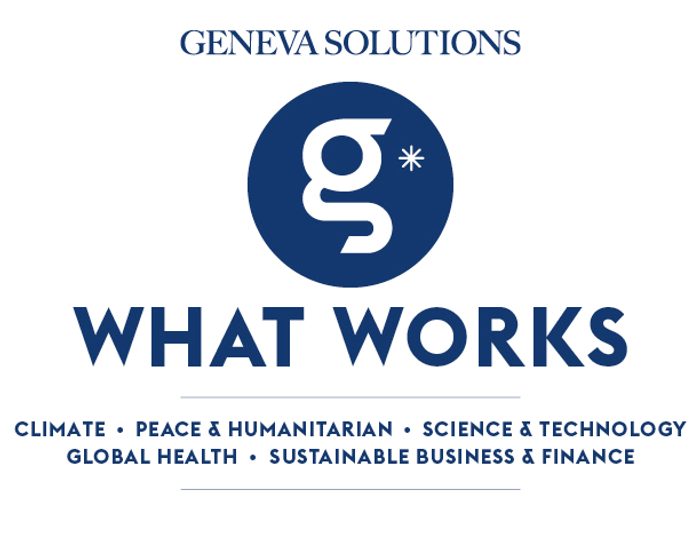 |
Good morning, this is Kasmira. Geneva Solutions and the Geneva Press Club hosted a debate yesterday on what Swiss and local authorities, as well as other actors like the private sector, can do to support international Geneva as organisations come to terms with the loss of US foreign aid.
Among the ideas suggested to give the hub a new sense of purpose: a “Bürgenstock conference” on multilateralism; or, as socialist politician Carlo Sommaruga suggests, a new project to make international Geneva the engine room for the post-2030 sustainability Agenda. What’s clear, he says, is that there needs to be greater engagement from all Swiss parliamentarians in defending international Geneva and the peace and humanitarian values it represents as a national priority.
Greater public-private sector engagement, as Fabrice Eggly, director of the Fondation pour Genève and one of our speakers, points out in our interview below, will also be crucial – and a rebalancing of alliances away from a largely westernised system. |

|

Fabrice Eggly, director of the Fondation pour Genève, said the philanthropic and private sectors could step in to provide more targeted support to international organisations in Geneva, 10 April 2025. (Geneva Press Club/Amandine Lacroix)
|
|
Since US president Donald Trump’s decision in January to bring foreign assistance to a screeching halt, international organisations and NGOs in Geneva have been left scrambling to digest the following onslaught of decisions and the trail of devastation left in its wake. In just six weeks, 77 per cent of global programmes run by the US Agency for International Development have been axed, including $10.3bn in grants to organisations either headquartered or with a presence in Geneva.
Though the Geneva canton’s decision-making body has sought to move quickly with CHF10m in emergency funding for cash-strapped NGOs, a larger, more coordinated plan of action involving the Swiss authorities to strengthen international Geneva and defend its multilateral values is still proving elusive.
Fabrice Eggly is the director of Fondation pour Genève, which works closely with the city and the canton to promote international Geneva at home and abroad. He joined a panel organised by Geneva Solutions and the Geneva Press Club on Thursday to address the crisis, alongside representatives from the canton, the foreign ministry and from two of Switzerland’s political parties. Interviewed ahead of the event, Eggly said that the multilateral centre will rebound but may have to learn to survive on fewer resources in the longer term.
Read the full story on Geneva Solutions.
|
|

Ukrainian sappers at work during demining operations in the Kharkiv area, northeastern Ukraine, 12 March 2025. (Keystone/EPA/Sergey Kozlov)
|
|
🧨CLEARING THE WORLD’S BIGGEST MINEFIELD.
174,000 sq km of Ukrainian land is thought to be riddled with mines – nearly one third of the country. Since the beginning of the Russian invasion in 2022, 335 people, including 18 children, have died and 823 have been injured as a result.
|
|
Concerted effort.
A wide group of actors and over 250 demining machines have managed to clear 35,500 square km of land, including 1,000 hectares of farmland, which are crucial for Ukraine’s role as a major grain exporter. Many of them gathered in Geneva this week to discuss progress.
|
|
Techy solutions.
While such risky work usually takes years if not decades, innovative tools like thermal drone cameras and AI-driven analysis have helped speed up the pace and bring down the cost.
|
|
The paradox.
Ukraine’s excruciating experience with these destructive weapons hasn’t discouraged it however from seeing it as a means of defence from Russia, nor has it deterred other European countries, now seeking to exit the Ottawa treaty banning landmines.
Le Temps via Geneva Solutions (EN)
|
|
🧠MENTAL HEALTH IN CLIMATE-HIT COMMUNITIES.
One of the first studies looking at mental health in teens living in areas hard hit by climate change found teaching young people sustainable farming techniques and keeping them in school could help ward off anxiety, depression and climate worry.
The authors interviewed young people living in one of the world’s most climate-impacted areas in southern Madagascar. They found that 90 per cent of teens had seen families run out of food and nearly 70 per cent had gone for a day without eating.
Climate Home News (EN)
|
|
Here’s what else is happening
-
🛠️Inside WHO's reforms: Progress, failures, and unfinished business.
In spite of nearly 100 reforms carried out in recent years, the World Health Organization still has work to do to make it more agile and fit-for-purpose, according to more than a dozen health experts and agency staff.
Devex (EN)
-
🚪Unfpa chief to step down months before term ends.
Natalia Kanem, executive director of the UN Population Fund, will leave in July, amid funding uncertainty caused by the suspension of US funding to programmes such as maternal health care, protection from gender-based violence and rape treatment. We had asked her one year ago how she was gearing up for a possible Trump presidency.
Devex (EN)
-
𖥂Red Cross concerned by drone attacks on critical infrastructure in Sudan.
Attacks on hospitals, electricity and infrastructure are contributing to rights violations in the war-torn country, where 70-80 per cent of healthcare facilities no longer operate.
Reuters (EN)
-
🐆What does Cites data tell us about the legal wildcat trade?
The database compiled by the global wildlife trade agreement offices shows that discrepancies exist in entries relating to wildcats, including mismatches in export and import reporting and false declarations.
Mongabay (EN)
|
|
GS news is a new media project covering the world of international cooperation and development. Don’t hesitate to forward our newsletter!
Have a good day!
|

|
|
Avenue du Bouchet 2
1209 Genève
Suisse
|
|
|
|









